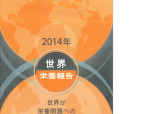
Global nutrition report 2014: Actions and accountability to accelerate the world's progress on nutrition [in Japanese]
The Global Nutrition Report (GNR) provides a global profile and country profiles on nutrition for each of the United Nations’ 193 member states, and includes specific progress for each country. It will be a centerpiece of the Second International Conference on Nutrition (ICN2) in Rome on 19-21 November, organized by the UN Food and Agriculture Organization and the World Health Organization.
Supplementary Online Materials ix
Acknowledgments x
Abbreviations xii
Executive summary xiii
Chapter 1 ntroduction 2
Chapter 2 Nutrition Is Central to Sustainable Development 7
Chapter 3 Progress toward the World Health Assembly Nutrition Targets Is Too Slow1 5
Chapter 4 The Coexistence of Different Forms of Malnutrition Is the “New Normal” 22
Chapter 5 The Coverage of Nutrition-Specific Interventions Needs to Improve 29
Chapter 6 Interventions Addressing the Underlying Determinants of Nutrition Status Are Important, but They Need to Be More Nutrition sensitive 38
Chapter 7 The Enabling Environment Is Improving, but Not Quickly Enough 47
Chapter 8 The Need to Strengthen Accountability in Nutrition 56
Chapter 9 What Are the Priorities for Investment in Improved Nutrition Data? 67
Chapter 10 Key Messages and Recommendations 71
Appendix 1 The Nutrition Country Profile: A Tool for Action 75
Appendix 2 Which Countries Are on Course to Meet Several WHA Targets? 77
Appendix 3 Which Countries Are on Course for Which WHA Targets? 79
Appendix 4 Donor Spending on Nutrition-Specific and Nutrition-Sensitive Interventions and Programs 84
Appendix 5 How Accountable Is the Global Nutrition Report? 86
Appendix 6 Availability of Data for Nutrition Country Profile Indicators 88
Notes 91
References 95
PANELS
Panel 11 Types of Nutrition Investment, Lawrence Haddad 4
Panel 21 Nutrition and the Sustainable Development Goals—No Room for Complacency, Michael Anderson 11
Panel 22 Some New Data from India: What If?, Lawrence Haddad, Komal Bhatia, and Kamilla Eriksen 12
Panel 23 How Did Maharashtra Cut Child Stunting?, Lawrence Haddad 13
Panel 24 Can Improving the Underlying Determinants of Nutrition Help Meet the WHA Targets?, Lisa Smith and Lawrence Haddad 14
Panel 41 Malnutrition in the United States and United Kingdom, Jessica Fanzo 25
Panel 42 Regional Drivers of Malnutrition in Indonesia, Endang Achadi with acknowledgment to Sudarno Sumarto and Taufik Hidayat 26
Panel 43 Compiling District-Level Nutrition Data in India, Purnima Menon and Shruthi Cyriac 27
Panel 44 Targeting Minority Groups at Risk in the United States, Jennifer Requejo and Joel Gittelsohn 28
Panel 51 Measuring Coverage of Programs to Treat Severe Acute Malnutrition, Jose Luis Alvarez 37
Panel 61 Trends in Dietary Quality among Adults in the United States, Daniel Wang and Walter Willett 41
Panel 62 How Did Bangladesh Reduce Stunting So Rapidly?, Derek Headey 43
Panel 63 Using an Agricultural Platform in Burkina Faso to Improve Nutrition during the First 1,000 Days, Deanna Kelly Olney, Andrew Dillon, Abdoulaye Pedehombga, Marcellin Ouédraogo, and Marie Ruel 45
Panel 71 Is There a Better Way to Track Nutrition Spending? 48
Panel 72 Tracking Financial Allocations to Nutrition: Guatemala’s Experience, Jesús Bulux, Otto Velasquez, Cecibel Juárez, Carla Guillén, and Fernando Arriola 49
Panel 73 A Tool for Assessing Government Progress on Creating Healthy Food Environments, Boyd Swinburn 51
Panel 74 Engaging Food and Beverage Companies through the Access to Nutrition Index, Inge Kauer 52
Panel 75 How Brazil Cut Child Stunting and Improved Breastfeeding Practices, Jennifer Requejo 54
Panel 81 Scaling Up Nutrition through Business, Jonathan Tench 61
Panel 82 How Civil Society Organizations Build Commitment to Nutrition, Claire Blanchard 62
Panel 83 Building Civil Society’s Capacity to Push for Policies on Obesity and Noncommunicable Diseases, Corinna Hawkes 63
Panel 84 Can Community Monitoring Enhance Accountability for Nutrition?, Nick Nisbett and Dolf te Lintelo 64
Panel 85 National Evaluation Platforms: Potential for Nutrition, Jennifer Bryce and colleagues 65
Panel 86 The State of African Nutrition Data for Accountability and Learning, Carl Lachat, Joyce Kinabo, Eunice Nago, Annamarie Kruger, and Patrick Kolsteren 66
